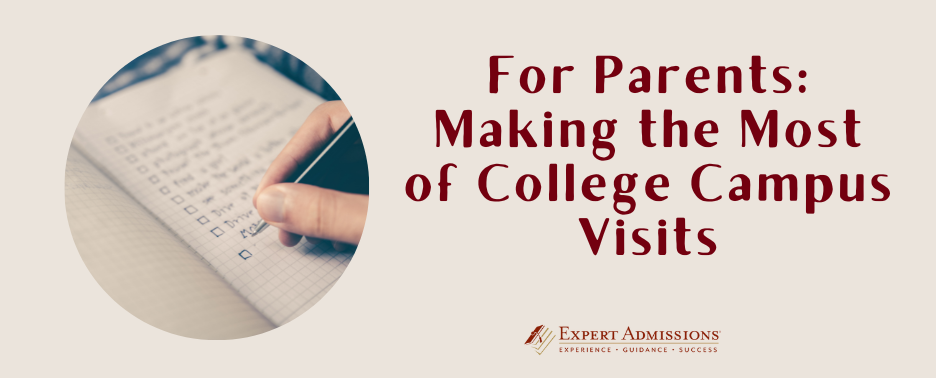
That time is finally here: your son or daughter is preparing to apply to colleges, and you’d like to visit some campuses as your student builds their list. Read on for some advice on how to get the most out of those campus visits, and how best to support your teen as they navigate this crucial step of the journey from high school to college.
Plan your visits early. As soon as you’ve researched colleges together with your student and determined which colleges you’d like to visit, you can start planning those trips. Spring break of junior year is a great time to visit college campuses, but you’ll want to make sure that school is in session at the college you’re visiting.
Late summer or early fall before your student’s senior year can also be a good time, after college classes have started. Seeing a school while class is in session is essential to getting a true feel for campus life. (Pro tip: if you’re traveling far to visit a college, consider visiting other colleges in the same area while you’re there!). If a school you’re interested in is too far to travel–or not offering in-person campus tours–consider a virtual tour.
Planning college visits should be a collaborative process. As you prepare for your first visit, have a conversation with your student about what questions are important to ask. Discuss your student’s specific interests with them–such as academics, clubs, and sports–and talk about how they’d like to explore those offerings on each campus. When you arrive for your campus visit, you’re going to want to let your student take the lead; talking in advance about how your visit will go will support them in doing just that.
When you arrive for your visit, it’s time to gather as much information as possible. Go for an official guided campus tour (keeping in mind that many colleges are using Covid-19 safety protocols for in-person visits). If the college offers separate information sessions for parents and students, take advantage of the opportunity to ask questions in a parents-only space (and allow your student to learn about the school in a student-only space). Talk to a variety of people, if possible, from folks in the admissions office to students and faculty members.
Once the official tours and college info sessions are over, explore the campus with your student on your own. Be sure to check out everyday spots such as the library, health center, gym, and quad. Learn about basic amenities like parking and laundry. Visiting the Student Affairs office and learning about campus safety protocols will give you some parental peace of mind.
And of course, no campus visit would be complete without checking out the dorms–ideally, those housing first-year students–and the dining options. Be sure to share a meal in a campus dining hall, if possible. As you explore, take notes and pictures, and give your student plenty of space to gather their own impressions.
Exploring the town surrounding the campus is also a great way to get a sense of the place your student might call home for four years. A walk around town and a relaxing dinner can be a great opportunity to sit down and talk about what you observed on campus.
Talk with your son or daughter about the visit: what did they like about the college? What gave them pause? Acting as a sounding board for your student is a great way to support them and encourage their enthusiasm for the college application process. Give advice or opinions if asked, but let your student lead the conversation.
Remember that college visits are one step in what is sure to be a powerful journey. Your student is a teenager, and the interests and passions they have now are likely to change. Keep an open mind, and don’t get attached to a particular school for your daughter or son after those college visits are over. Supporting your student while letting them lead the way is the foundation of a successful college application process.
Leave a Reply